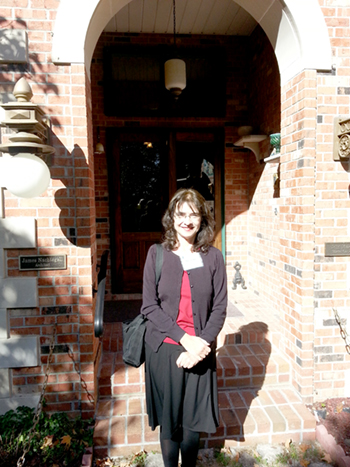By Mary Grabar, posted May 14, 2012.
That many (if not most) of our college professors use their classrooms as places to sway young minds to their radical political views is a well-known fact. This sea change in education can be traced back to the 1960s when radicals transformed the university from a place of open scholarly inquiry to a production house of political ideology. This was accomplished with force, with radicals, sometimes armed, taking over deans’ offices and holding college presidents hostage.
These radicals’ impromptu “Teach-Ins,” providing platforms for propaganda against the Vietnam War, social “injustice,” and the Man, were places for rallying the troops of protestors. In subsequent decades, these same radicals acquired tenure. So many of our classrooms, in content and tone, are like the teach-ins of yore.
Of late, deans have even formally organized such “teach-ins.” One that I wrote about was the “Teach-In on Tucson” at Georgia State University College of Education on February 4, 2012. As to be expected, there was nothing scholarly about the event, with one-sided presentations on the Arizona law that forbids the teaching of material that is subversive or inspires hatred against ethnic groups. The wording of the law was never even discussed; instead, seeing it as a threat to the group’s efforts to use K-12 classrooms as indoctrination labs, the activists, professors, and teachers claimed that it presented censorship and a means of implementing immigration laws. That this event was publicized and open to the public with the blessings of the Dean of the College of Education, Randy Kamphaus, who gave the opening remarks, much of it in Spanish, indicates the level of insouciance with which educators operate.
Good Guys
I testified at the Georgia House Judicial Committee (non-civil) hearing on SB 458 (an immigration bill) on March 19, 2012, about GSU Associate Professor of Education Jennifer Esposito’s pledge at the Teach-In to give students “extra points” for writing letters to legislators opposing immigration enforcement legislation. Chairman Rich Golick, at that point, indicated that these were serious charges warranting a follow-up. Representative Golick has kept to his word. On April 16, Tom Lewis, Vice President for External Affairs at Georgia State University, replied to Golick’s letter about the matter. Golick had apparently expressed his concerns over the incident and had included the video clip that I had sent him showing Jennifer Esposito making her pledge. For this, Golick is to be commended.
Asking students to lobby on behalf of legislation in exchange for grades is bribery. That is akin to promising good grades in exchange for other kinds of favors and gifts, including cash.
It is heartening to see that not only Representative Golick, but also Governor Nathan Deal and Chancellor Hank Huckaby, replied to my April 19 letters regarding this incident. The Governor’s office responded with a letter on April 30 indicating that my correspondence had been forwarded to Senior Vice Chancellor Tom Daniel. Chancellor Huckaby replied with a May 7 letter to me that affirmed his and the Board of Regents’ condemnation of “the use of University System facilities and resources by any employee of the Board to further the employee’s personal political agenda.” He said it violates “students’ trust” and “Board of Regents policies governing political activities.”
Chancellor Huckaby also forwarded to me Tom Lewis’s response to Representative Golick. Lewis wrote that the University Attorney was asked to investigate the matter of Esposito’s pledge to give extra credit to students. Such an offer, he stated, was “unacceptable.” However, the investigation showed “that when the professor actually made the offer of extra credit to her students on February 23, 2012, she informed them that she would assign extra credit to students who wrote letters to their legislators either in support of or opposition to legislation.”
Lewis concludes with, “The faculty member understands that her remarks at the event were inappropriate. The faculty member’s Dean spoke with her about the matter and provided her with a memo reminding her of her responsibilities under the policies of the Board of Regents as well as state and federal law regarding political activities. In addition, President Becker and Provost Palm have instructed all deans and vice presidents of their obligations regarding political activities so this information could be shared with their respective areas.”
Fox and Henhouse?
The “faculty member’s Dean,” however, is the same College of Education Dean Randy Kamphaus. On the Teach-In program, he was listed at the top of the list of co-sponsors and was thanked for his “generous support.” One could safely assume that if he was not the main impetus behind the event, he at the very least gave it his full blessing, as evidenced by his opening remarks that can be heard on the video above. (The political nature of the event is given away immediately afterwards by Alyssa Dunn’s references to standing “in solidarity” with Tucson teachers and to HB 59. See also the “spoken word” performance of Clayton State University Assistant Professor of Education Mari Ann Roberts below.) He had to know the entire nature of the event, which, contrary to Lewis’s claim in the letter to Golick, was not merely “an educational event organized by several universities and community members to inform interested educators on a prohibition in Arizona of certain ethnic studies.”
The event, including the workshop I attended, was aimed at far-left activists (the socialist paper, Workers World, was distributed in the workshop room) and teachers who were vehemently opposed to eliminating curricula that admittedly inspired activism in students. The relative merits of the curricula were not debated at all. Instead, participants, including undergraduate education majors from GSU and Clayton State University (in history, music and physical education) were given pointers on how to sneak such prohibited incendiary curriculum materials into the classroom. Participants were not “informed”; they had already made up their minds, as indicated by the announcements that went out. Much of the organizing activity on the umbrella group Georgians for fREADom Facebook page showed a decided political agenda. One posting of photos was described as “Solidarity Planning Meetings.” The participants wanted to prevent such laws from entering Georgia, and such laws were seen as closely tied to immigration laws. Much of the discussion was on lobbying against immigration bills, which were named (e.g., HB 59).
A post-Teach-In posting about one of the three afternoon workshops read, “Another session focused on legislative action. Participants discussed issues related to educational policy and immigration in Georgia and wrote letters to policymakers, legislators, school administrators, and other stakeholders.” Writing letters to policymakers and legislators goes beyond the bounds of “information” and “education” that organizers claim.
My guess, from working in academia for two decades, is that the “memo” is a pro forma gesture intended to appease critics. The political nature of Esposito’s class is indicated by the title itself, “Race, Class and Gender in Education.” Sad to say such classes focusing on "race, class and gender" are common in education colleges. I also know that the rare conservative education graduate student who makes it to a graduate-level seminar knows better than to oppose such a professor, especially in a letter to a legislator. The fact that such ideological courses have nothing to do with students’ performance in subject areas reveals how politicized the entire endeavor is.
The fact that Esposito believes, like many professors and teachers do, that letter-writing is an appropriate educational activity for teachers shows the rot and ideological corruption of higher education, particularly in the training of future teachers. The fact that Dean Kamphaus would commit to such a political event indicates how high up such thinking goes. He is like the proverbial fox guarding the henhouse. When we wonder why the U.S. is 25 in math and 17 in science in global ranking, we can attribute at least part of it to the wasting of time on such nonsense—as well as time and energy spent by GSU education majors on traveling abroad to study “ethnomathematics” and listening to lectures on mathematics as a subversive activity as part of GSU’s “Research Wednesday Speaker Series.”
Giving Voice Back to the People
It seems that Golick and Huckaby did what they could given the hierarchical structure of the academy, its chain of command, and repeatedly irrelevant references to the days of Governor Eugene Talmadge when he replaced members of the Board of Regents with segregationists. This was in 1941. Yes, the latter irrelevant point from 71 years ago was used to defend the imperial power of the education bureaucracy during the debate on SB 458 that, in part, would have prohibited illegal aliens from attending all public colleges and universities in Georgia. As it stands, the academy is so insular that citizens and their representatives have no one to appeal to other than those advocating such unethical behavior to begin with.
The kind of behavior Esposito pledged to engage in was beyond the pale. Although it would never have been considered by any self-respecting professor in the days of old, today’s activist-teachers take it as their duty. Professors and teachers in other states have given students credit for participating in left-wing political activities, from the “Occupy” movement, to Obama campaign activities, to the Wisconsin rallies. The fact that no one at the teach-in questioned Esposito’s pledge, but enthusiastically applauded it and similar pledges, shows how widely accepted by educators such practices are these days.
It shows that reform must come from the people and their elected representatives. The very same people who organized the highly politicized "Teach-In" cannot be expected to monitor themselves.
I hope that Representative Golick and other elected representatives use this as initiative for reform during the next legislative session. I hope Chancellor Huckaby realizes that the Board of Regents cannot rubber stamp the policies of college presidents and deans.
The Board of Regents, instead, should adopt a policy that specifically prohibits such quid pro quo in the classroom and that outlines specific punishments for it, beginning perhaps with a written account in personnel files. Repeated violations should lead to expulsion.
Our legislators need to introduce legislation that would provide oversight. Stricter guidelines need to be set. Those whose salaries we pay should, like all other employees, have a job description and clear-cut guidelines on acceptable behavior. There should be much more transparency when it comes to academic activities. Citizens have a right to know what goes on in our public universities.
As it stands, the radicals who are now in control in our public universities are simply hoping to quiet citizens who dare to complain. They want nothing more than to go back to business-as-usual.
We should not let them. Rich Golick’s public statement and follow-up letter was a very important first step. I encourage Representative Golick and like-minded legislators to use this incident as the call to arms on efforts to reform our public universities. What went on at the "Teach-In" represented the dominant thinking in our universities. I hope much will happen in the next legislative session.
I also know that Golick and other reform-minded legislators face a formidable, fully entrenched political educational bureaucracy. They need the support and encouragement of concerned citizens.
Representative Rich Golick: (404) 656-5943
Chancellor Hank Huckaby: (404) 656-2202
Governor Nathan Deal: (404) 656-2211





